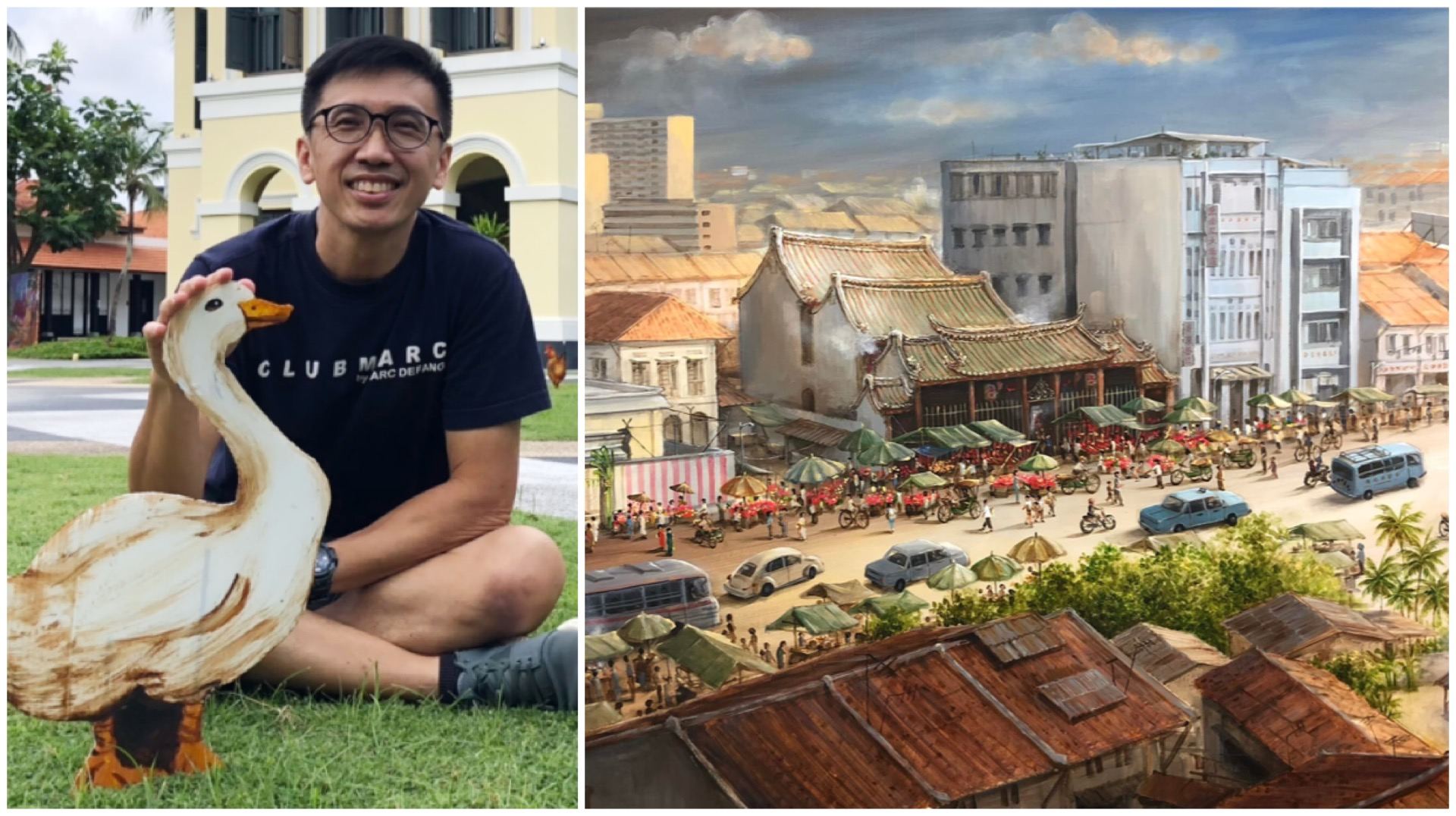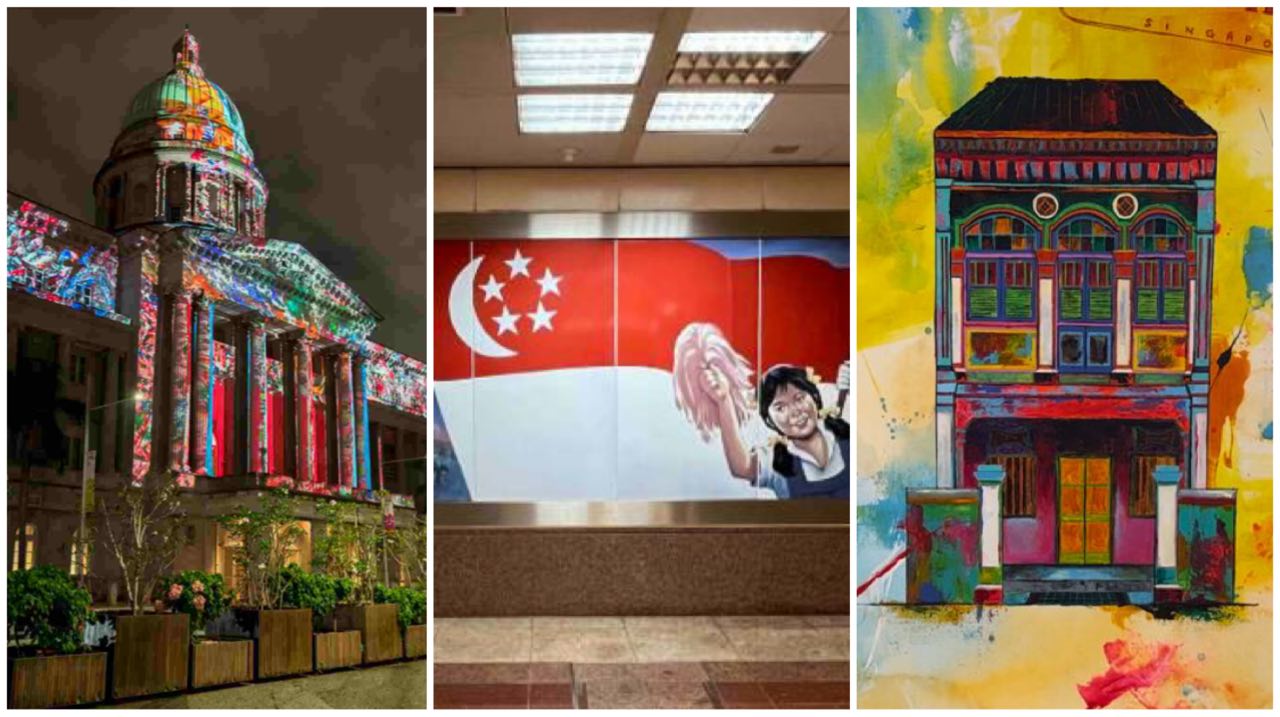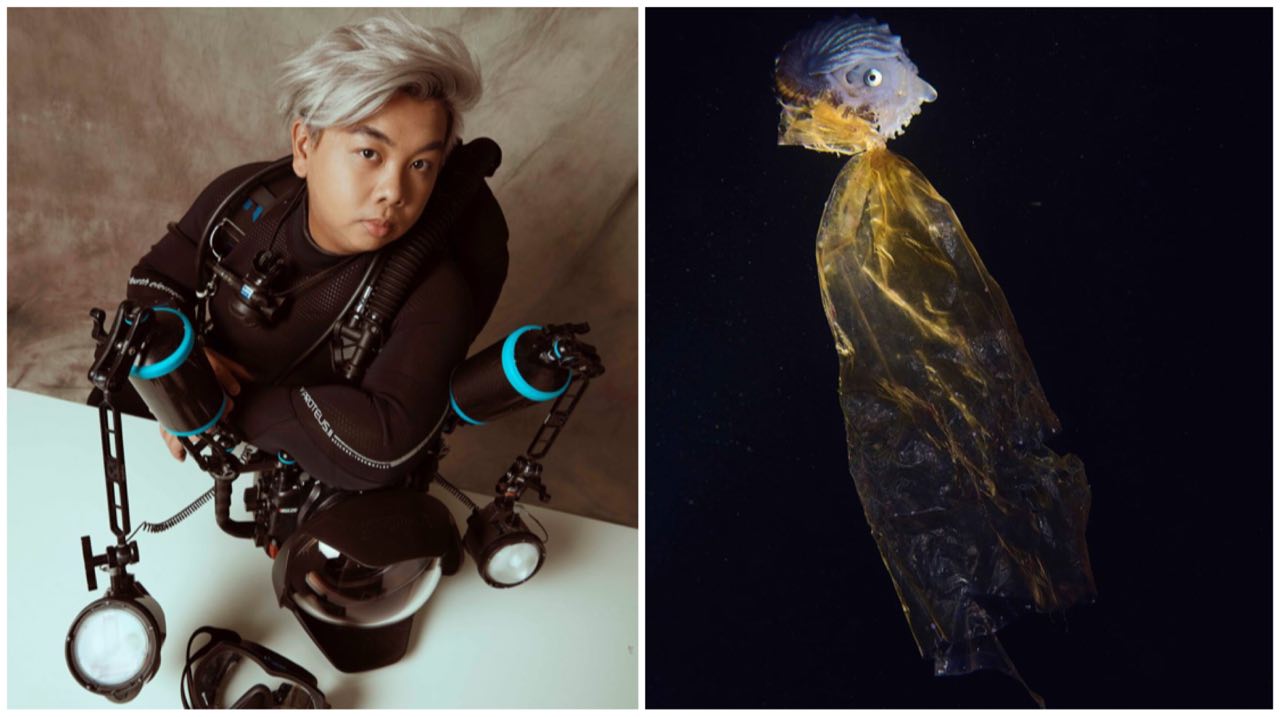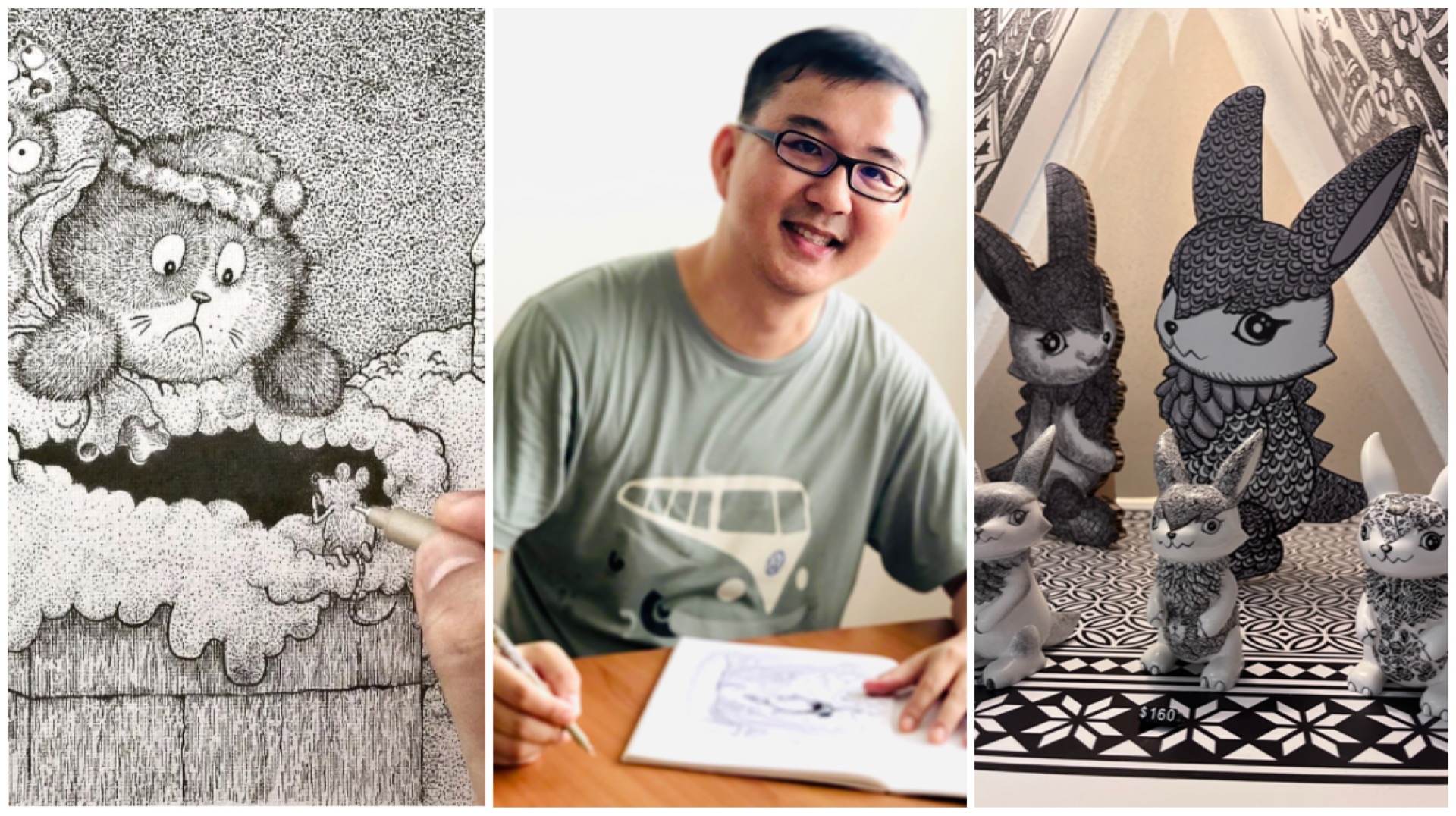Artist Behind The Art: Yip Yew Chong Keeps Things Simple, Practical And Fun
If you're looking to find great meaning or symbolic allegory in artwork by Yip Yew Chong, don't - because there's probably none. The artist, arguably Singapore's most profilic muralist, is a self-confessed pragmatist, the word "practical" popping up more than a few times in our conversation.
"It’s just for fun - no message or anything serious about it. Don’t have to take all this too seriously!" says the youthful-looking 53-year-old father of two (his son and daughter are 24 and 22, respectively).
Over the weekend, Yew Chong brought his hand-painted chicken and duck cut-outs to the Malay Heritage Centre at 85 Sultan Gate for a "guerrilla" catch-it-if-you-can installation on the centre's lawn. They've since, um, flown the coop.
"It’s more fun, you know," says Yew Chong of guerrilla art. "It comes as a surprise, like a storm - poom! And then it’s gone. You have to catch it in the moment."
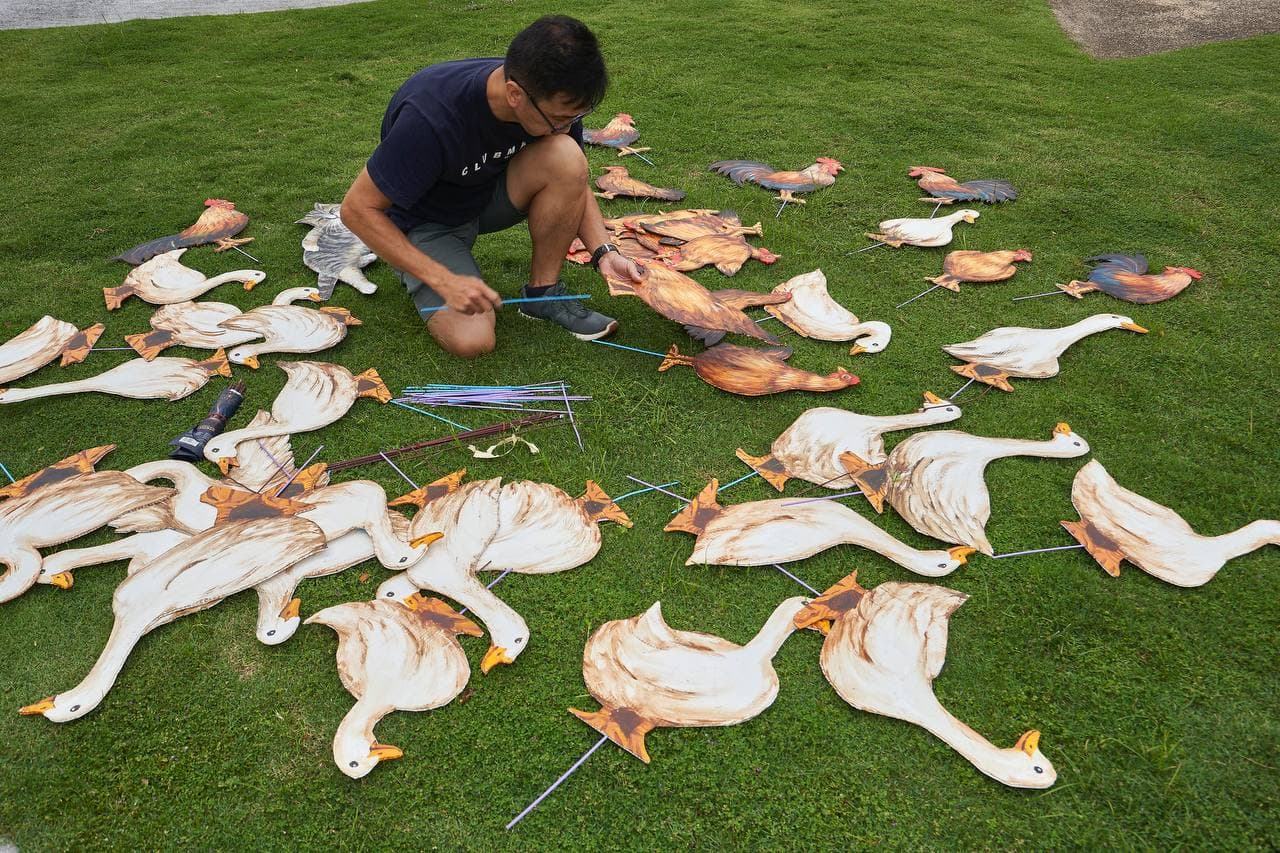
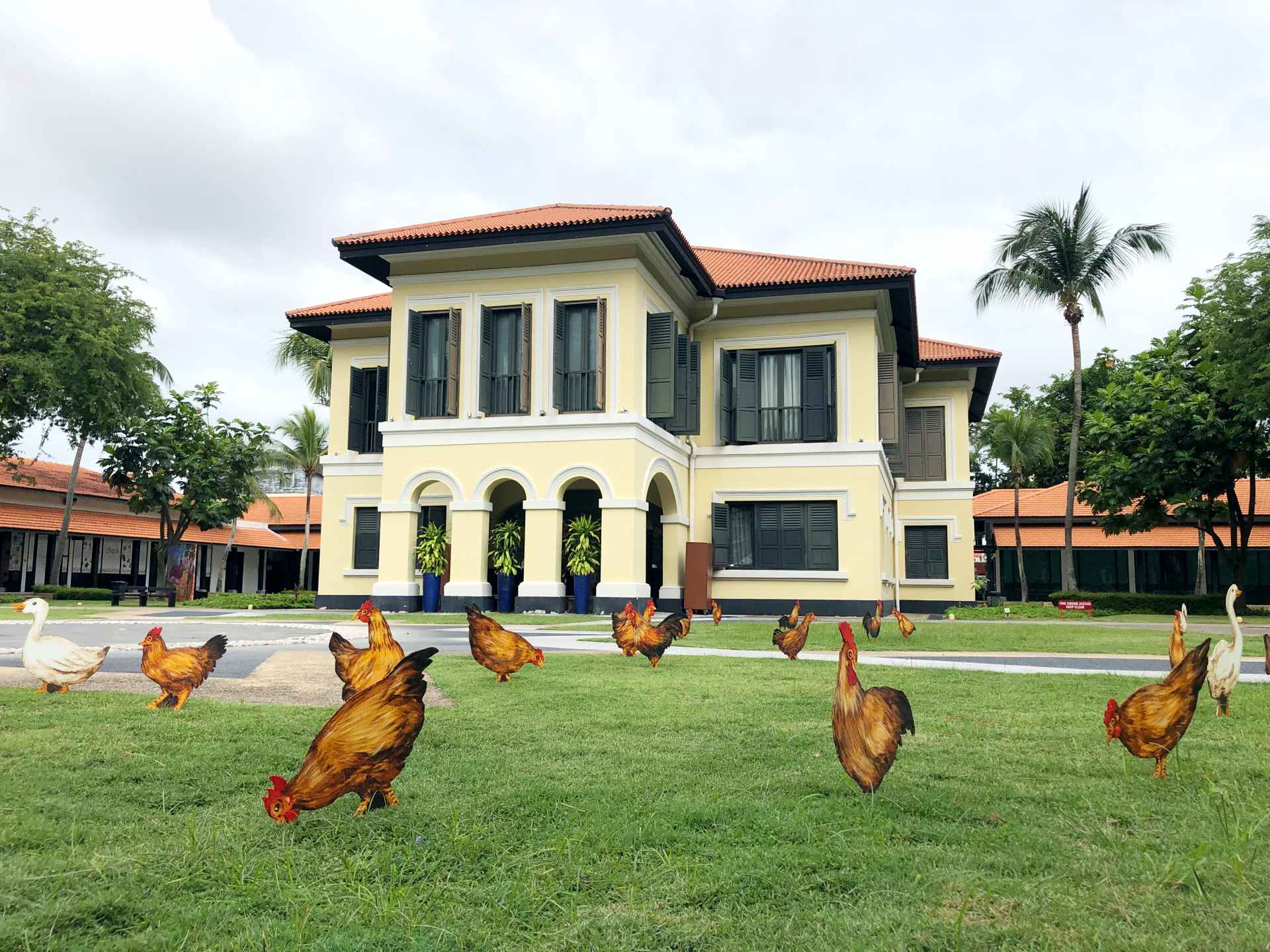
Fun fact: there were originally 24 chickens and 25 ducks - three went missing. Again, the numbers hold no significance. "I was aiming for 50 but I ran out of cardboard!" Yew Chong says matter-of-factly, and recounts a funny moment when he first displayed his flock of fowls outside Kebun Baru Market Market and Food Centre (as part of an "Arts in the Neighbourhood" programme by the National Arts Council).
"Those auntie-uncle counted the number of chickens and ducks and bought 4D! First week, second week, third week... never strike. The final week, one auntie came and told me, 'Second prize leh!'" says Yew Chong, who added a cat (which he painted the day before) to the display at Malay Heritage Centre.
"The cat? The cat is to jaga the chickens and ducks!" says Yew Chong facetiously of the feline which took him about an hour-plus to paint. "No, again, nothing serious - it’s for fun! After displaying the chickens and ducks a few times, I think people also get bored already, so you must have something new - just throw in a cat lah!"
We sat down with the pragmatic artist to talk about making the switch from accounting to art, life principles and even how national service had an impact on his art.
You were an accountant for 25 years. What was your greatest fear making the decision to be a full-time artist in 2018?
No fear. It was such a smooth transition for me.
When I was working, Monday to Friday I was in the office. Saturday, Sunday I was out on the streets painting. The murals were warmly received and I got more and more requests and commissions to the extent that [that life] was not sustainable - for my health, my time, my family.
By then, I also felt that my family obligations had been fulfilled, and my children had grown up. My wife was the one who nudged me to spend time to develop my art because I had already worked 25 years in accounting and built comfortable reserves.
You could say becoming an artist was like being “semi-retired”. At first I used that term, but now, no lah - this is a full-time job for me. Not a job lah, a full-time passion!
What are some of the life lessons you've gleaned from being a full-time artist in the last four years?
Don’t take things too seriously, and keep it simple. By doing so, you keep things practical. Accountants are practical. Artists should also be practical. Make things of a scale that you can fulfil easily.
I don’t overplan. [When I paint,] I have a broad idea, and flow along with it. Along the way, I explore, I can take detours, and adjust the plan very easily - very flexible. Same with travelling, which I love - I don’t plan the whole route; I might make a detour along the way, and find things that are even more interesting. When I took a break from my career as an accountant, I didn’t even plan to do murals - I had planned to make videos and short films; I even bought all the equipment!
Once you get an opportunity, you should grab it. In this fast-changing world, people’s attention spans are very short. So you must strike while the iron is hot. Once you do something (like this chicken and duck installation), and people like it, you better do the next one quickly. But after that, you must also know when to stop. And then, keep innovating and adapting.
If it doesn’t work, you must let it go. If you have to spend tons of money to upkeep your passion, it doesn’t work - it’s not practical. You will go bankrupt and cannot feed your family. That’s my accountant mindset hahaha!
Art should be seen, and enjoyed and appreciated by people. Otherwise you create art for what? I enjoy the process of creation. I also enjoy it when the artwork is displayed and people enjoy it - that’s the idea. If people buy it, even better! I like to mingle with the public when painting. I will oblige any photo opportunity, unless I need to run.
You're such a prolific artist with a large body of work. Which is your favourite piece? And tell us the story behind it.
My favourite mural is “My Chinatown Home” (shown above), a privately commissioned mural by the home owners at 30 Smith Street. In fact, a majority of my works are privately commissioned.
The subject matter, the composition, the theme, the mood and the overall ambience of it are most intimate to me. I grew up in that house (in the mural), I lived there for the first 14 years of my life, before Chinatown was cleaned up. But I don’t cling on to nostalgia. I don’t call it “the good old days” - no, no, no. There was a lot of hardship also - risk of fire, water dripping from the roof, rats, mosquitos… all these things, people don’t remember. Now is good!
When I wanted to paint in Chinatown, I planned 6 themes: “The Letter Writer”, “Mid-Autumn”, “Cantonese Opera”, “Paper Mask and Puppet Seller”, “Wet Market” and “Clock Maker”. And “My Chinatown Home” was not one of them. I had suggested doing “Wet Market”, but after I drew out the sketch and submitted it to URA, URA said you cannot paint on the existing doors and windows, because this is a conserved house - the doors and windows must be left as they are.
The house owner and I went back to the drawing board. So I suggested “My Chinatown Home” and integrated the windows and doors as part of the scene. It was a blessing in disguise.
This is why I keep saying: You can plan, but you may get disappointed, but you don’t have to hold on to this because better things will come. And when you plan something, you must be willing to take a detour.
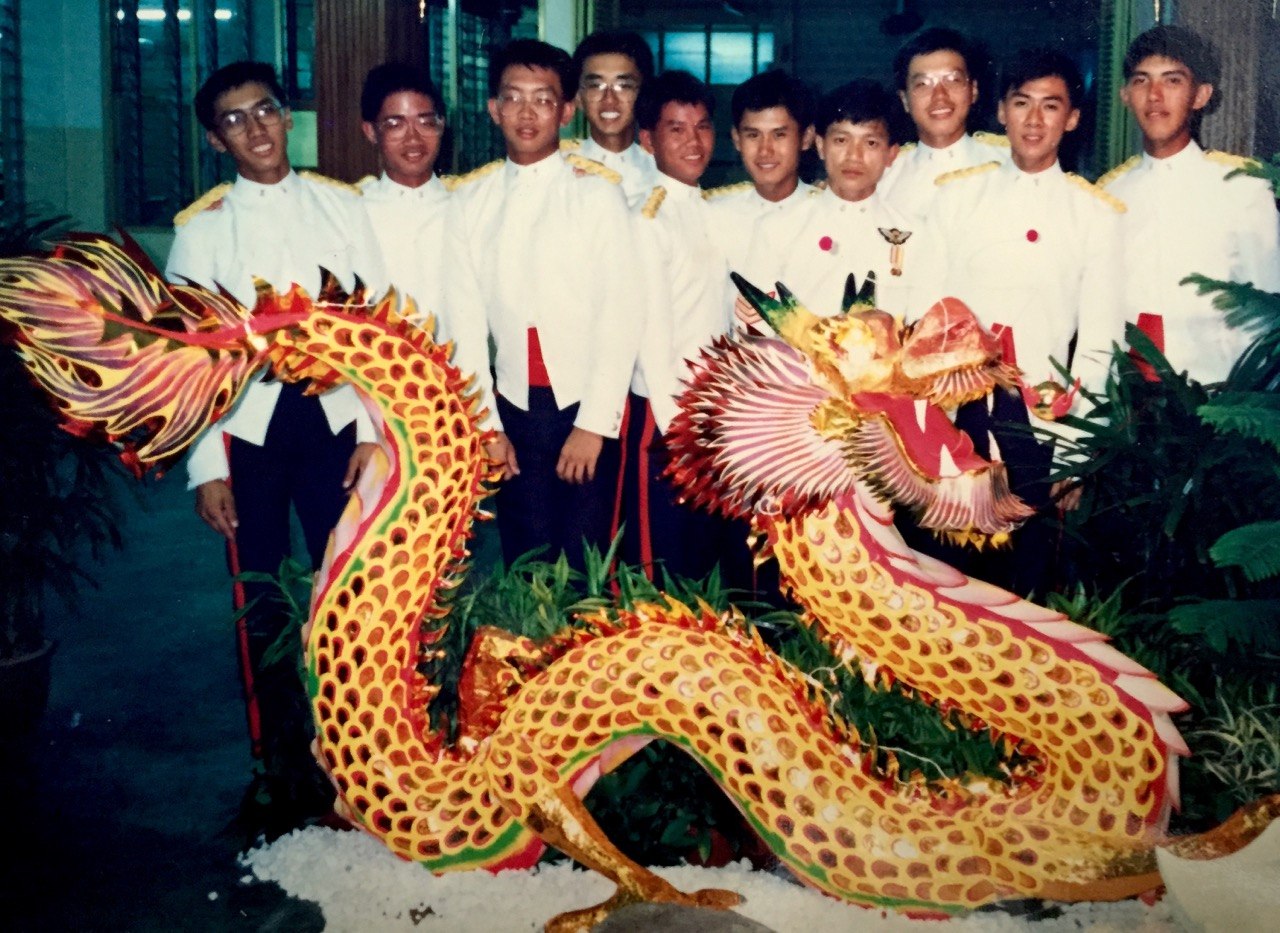
In one Instagram post (shown above) about the NS-related mural you painted at 51 Waterloo Street, you wrote: "I really enjoyed the conscription (2.5 years full-time, another 17 years in readiness). I felt it was a good experience." Plus, you got to create some art in the form of a giant dragon lantern while in OCS. How did national service inspire you - or your art?
After BMT, I went to SAFINCOS (SAF Infantry Non-Commissioned Officer’s School). After that in 1988, I jumped over to OCS and became an OCS instructor, and was later the OC of an infantry company, and then a Dy S3 in the Brigade. I enjoyed it - I had done instructorship, operations, and planning. I found it was very useful.
I learnt two key lessons in the army: 1) how to cope with disappointment, and 2) how to speak up for your subordinates.
On coping with disappointment: I didn’t get a posting (in Guards) that I was fighting for. I was so miserable for a long time. But if I had gotten it, I wouldn’t have done the other things. Just like many of the murals I do today, some locations don’t work out. But I always remind myself, it’s okay, the time is not right - it will come one day in an even better mode, a nicer wall! So I keep the idea and concept, and subsequently, I apply them on better walls, and because I have progressed in my skills by that stage, the mural is even more eye-catching and impactful!
(On the second point, Yew Chong writes in the IG post: "I made many mistakes in handling people matters due to my immaturity and inexperience. Looking back, these slips, embarrassments and disappointments were such important life lessons.")
Tell us more about the massive 50m-long painting (shown above) that you're working on right now!
In 2020, during the pandemic, I went on a painting spree on canvas, because many of the outdoor projects were cancelled or postponed. I did so many canvas paintings that I managed to hold two solo exhibitions in 2021.
Once you start something like that, you don’t stop. Moreover, canvas paintings are more collectible, long-lasting and more valued than transient murals.
That’s why I started the 50m project, which I target to finish later this year for a show next year. I’m completing my 7th out of 23 pieces.
It’s not the length that I’m going for - it’s the meaningful content that I want to focus on. What is important is that the overall content of this painting is as inclusive and representative as possible of Singaporean everyday life - whether it is urban, natural, heritage, people, buildings, food, culture.
Many of your projects are on a large scale, and are pretty time-consuming. What do you think about when you're painting?
I concentrate fully when I’m painting. I try to imagine in my mind what the outcome will be. It’s like I’m painting with the mind, and the eye will be like, "Confirm? Double confirm?" It’s very meditative and therapeutic. I’m in a happy state.
I think it’s the same for most artists - they enjoy the process. When you enjoy something, you just do it. Some people play video games, wah, whole day don’t need to eat, don’t need to go toilet! If you’re doing something you’re passionate about, you will just enjoy it.
For the latest updates on Wonderwall.sg, be sure to follow us on Facebook, Instagram and Telegram. If you have a story idea for us, email us at [email protected].







